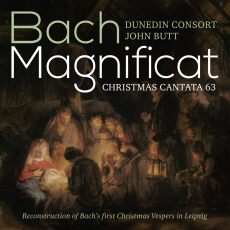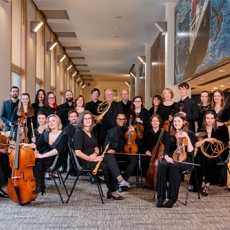Dunedin Consort - J.S. Bach: Magnificat - MusicWeb International
In 2013 I gave a warm
welcome to the Dunedin Consort's excellent recording of Bach's Johannes-Passion. Not only was the performance itself admirable but the
release was all the more rewarding because John Butt presented the great
Passion setting in the context of a conjectured service of Vespers as it might
have been celebrated in Leipzig on Good Friday 1739. For this new recording of the
Magnificat he's adopted a similar approach, setting Bach's great piece in the
context of Christmas Day Vespers in the Nikolaikirche as the liturgy might have
been presented in 1723.
As John Butt explains in his comprehensive and
fascinating booklet essay, the service of Vespers on Christmas Day would have
been a substantial one, including a full-length sermon - and bear in mind that
the congregation would already have attended an even longer Morning Service. On
an occasion such as this the liturgy would have followed the old Roman rite to
some extent. Thus the Magnificat would have been sung in Latin. However, the
psalms that are customarily recited or sung in the Roman Catholic liturgy would
have been replaced by a cantata. In this case Bach used his cantata Christen, ätzet diesen Tag, probably composed for Christmas 1714 in Weimar. As
Christmas 1723 was Bach's first in Leipzig it has long been thought that he
composed the resplendent Magnificat in E flat for that occasion. However, John
Butt tells us that recent research suggests the piece was composed for a major
Marian feast, the Visitation (2 July 1723), which fell within a few weeks of
his arrival in Leipzig. Into the text of the Magnificat Bach injected four
short additional movements - two in German and two in Latin - the texts of
which are specific to Christmas. Naturally, these are included in the present
performance. Butt also gives us a good flavour of the rest of the service by
letting us hear some organ pieces and a couple of congregational chorales - for
which some 55 guest singers have been drafted in. It was impossible to fit
every last note of music onto one SACD so a couple of other tracks - a hymn and
some sung prayers - are available as a free download from the Linn Records
website.
Before discussing the performances it may be
helpful to explain vocal the forces involved. The Gabrieli piece is performed
by two four-part choirs - one voice to a part - with organ, cello and violone
in support. Eight singers are used also for the cantata: the four soloists,
reinforced by four ripienists in the choruses. The Magnificat calls for five
voices so there are five soloists and an equal group of ripienists.
The liturgy opens with a short, sprightly Gabrieli
motet. After that and a short organ prelude the festivities really begin in
earnest. Christen, ätzet diesen Tag (‘Christians, etch this day') is a
lavish piece, requiring not only timpani and three oboes but a quartet of
trumpets - the largest group of trumpeters that Bach ever deployed, I believe.
The opening chorus is in the customary ABA form and the A sections are
gloriously festal. As soon as you hear the wide-eyed eager enthusiasm with
which the sopranos articulate the first word you can tell we're in for
something special and so it proves. The opening chorus shines, the articulation
of singers and instrumentalists superb. My goodness, this movement must have
made the Leipzig congregation sit up, any Christmas afternoon lethargy well and
truly dispelled.
Clare Wilkinson has a slightly lean tone but she
invests her recitative with fine expression. In the duet that follows Joanne
Lunn's appealing soprano blends well with Matthew Brook's firm, warm voice. A
word of praise, too, for the eloquent oboist who plays the obbligato in this
duet; I presume he is Alex Bellamy. Nicholas Mulroy is next up, in a
recitative. His voice is forthright rather than mellifluous and I'm not sure
his timbre is ideally suited here. In the duet that follows his voice is a
little too prominent against that of his partner, Clare Wilkinson. Matthew
Brook's timbre, however, is ideal for the hortatory bass recitative. In the
concluding chorus there are passages of majestic splendour but in the quieter
sections the use of just eight voices allows a good sense of intimacy. However,
it's the festive sections that make the greatest impact of all.
I thought it would be interesting to compare this
splendid cantata performance with the one given by Sir John Eliot Gardiner and
his Monteverdi Choir and English Baroque Soloists as part of their famous Bach
Cantata Pilgrimage. They performed Cantata 63 in the Herderkirche, Weimar on
Christmas Day 1999, right at the start of the Pilgrimage, and the splendid
recording is included in Volume 18 of their cycle. Gardiner's performance is very different in conception.
Not only is it live but also it's recorded with the performers rather more
distant from the microphones than are Butt's team - one has the sense of being
seated in the nave of the church. Furthermore Gardiner uses larger forces. He
has a choir of 19 (7/4/4/4) as well as his soloists and the orchestra numbers
29 - Butt has 16 players. Some of Gardiner's speeds are a bit swifter than
Butt's. His female soloists - Claron McFadden and Bernarda Fink - are rather
more lustrous in tone than Butt's very good singers. The tenor, Christoph Genz,
is lighter of timbre and sounds a bit more nimble than Nicholas Mulroy; Genz is
better suited to this music, I think. Overall, both performances are excellent
and they complement rather than challenge each other.
When it came to the Magnificat, which Butt
performs in the E flat version I planned to compare him with the only other
recording in that key which I have in my collection, namely a recording made in
the late 1970s by Simon Preston and the Choir of Christchurch Cathedral,
Oxford. However, quite early on I went to check a point against Gardiner's 1983
recording of the D major version of the score, a revision which Bach made
probably in 1733. To my surprise both the Gardiner and Butt recordings are
at the same pitch (Butt uses A = 392Hz). So Gardiner's version became the
logical comparator, though his performance doesn't include the Christmas
interpolations.
I've long admired the Gardiner, though I think one
or two of his speeds are a bit on the challenging side. Again, Gardiner uses
larger forces (a choir of 11/5/4/4) but such is the virtuosity of the
Monteverdi Choir that even at the brisk speed set by Gardiner for the opening
chorus they have no trouble in articulating it cleanly. The recording is rather
more set back than Butt's and this, allied to the smaller choral forces means
that Bach's magnificent choral part writing emerges with crystalline clarity.
All of Butt's soloists do very well - as do Gardiner's. I especially enjoyed
the gorgeous sound of Julia Doyle in ‘Quia respexit'. Oddly, I felt that
Nicholas Mulroy and Clare Wilkinson are much better matched in ‘Et
misericordia' than was the case in the cantata. Mulroy has the swagger and
vocal steel to make a fine impression in ‘Deposuit potentes'. It's a brute of
an aria which a good deal of highly demanding passage work. Anthony
Rolfe-Johnson gives a similarly bravura account of it for Gardiner but the
faster tempo adopted in that performance means that he doesn't articulate quite
as precisely as does Mulroy. In ‘Esurientes' Butt uses recorders, which are
specified in the E flat score, whereas the D major scoring is for a pair of
flutes so Gardiner follows that requirement. Both pairs of instruments sound
delightful but I think that Butt's slightly more relaxed pace catches the
pastoral mood better and Clare Wilkinson is delightful. Gardiner uses a male
alto, Charles Brett.
Overall, while I still remain mightily impressed
by the Gardiner I now think the Butt version is even more winning. It has more
charm, relaxes a bit more at times and it yields nothing to Gardiner in terms
of superb performance standards.
At the end of the Magnificat, sumptuously rendered
by Butt and his team, we hear a short, majestic organ prelude before the
stately hymn, robustly sung, brings proceedings to a close.
This is one of the most enjoyable and stimulating
Bach discs to have come my way since ... well, since John Butt's account of the Johannes-Passion. The performance standards are uniformly excellent and the
music is life-enhancing. That said, I also admire greatly the scholarship,
lightly worn, that has gone into the preparation of this project, which is most
imaginatively conceived. When you factor in also a fine, clear recording,
engineered by Philip Hobbs and Robert Cammidge, as well as scholarly and
eminently readable notes by John Butt this is a compelling package for Bach collectors.
Thinking back to the uplifting sounds I've heard in John Butt's jubilant
rendition of the opening movement of BWV 63, I'm in no doubt that I shall be
listening to this superb disc at some stage on Christmas morning.


